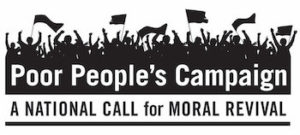
*On this date in 1968, the Poor People's Campaign, also known as the Poor People's March on Washington, began. It was an effort to gain economic justice for poor people in the United States.
It was organized by Martin Luther King, Jr. and the Southern Christian Leadership Conference (SCLC) and carried out by Ralph Abernathy in the wake of King's assassination. The Poor People's Campaign had complex origins. King considered bringing poor people to the nation's capital since at least October 1966, when welfare rights activists held a one-day march on the Mall. In May 1967, during an SCLC retreat in Frogmore, South Carolina, King told his aides that the SCLC would have to raise nonviolence to a new level to pressure Congress into passing an Economic Bill of Rights for the nation's poor.
The SCLC resolved to expand its civil rights struggle to include demands for economic justice and challenge the Vietnam War. In his concluding address to the conference, King announced a shift from "reform" to "revolution" and stated: "We have moved from the era of civil rights to an era of human rights." In response to the anger that led to the 1967 riots in Newark and Detroit, King and his close confidante, Stanley Levison, wrote a report in August (titled "The Crisis in America's Cities") that called for disciplined urban disruption, particularly in Washington. The Poor People's Campaign was motivated by a desire for economic justice: the idea that everyone should have what they need to live. King and the SCLC shifted their focus to these issues after observing that gains in civil rights had not improved the material conditions of life for many Blacks.
The Poor People's Campaign included Blacks, whites, Asians, Hispanics, and Native Americans, aimed at alleviating poverty regardless of race. Figures from the 1960 census, the Bureau of Labor Statistics, the U.S. Commerce Department, and the Federal Reserve estimated that 22 to 33 percent of Americans lived below the poverty line. At the same time, poverty was changing as America's population increasingly lived in cities, not farms (and could not grow its food). Poor Blacks, particularly women, suffered from racism and sexism that amplified the impact of poverty, especially after "welfare mothers" became a nationally recognized concept. By 1968, the War on Poverty seemed like a failure, neglected by the Johnson administration (and Congress) that wanted to focus on the Vietnam War and increasingly saw anti-poverty programs as primarily helping Blacks.
"The Poor People's Campaign sought to address poverty through income and housing. The campaign would help people experiencing poverty by dramatizing their needs, uniting all races under the commonality of hardship, and presenting a plan to start a solution. Under the"economic bill of rights," the Poor People's Campaign asked for the federal government to prioritize helping people experiencing poverty with a $30 billion anti-poverty package that included, among other demands, a commitment to full employment, a guaranteed annual income measure, and more low-income housing. The Poor People's Campaign was part of the second phase of the civil rights movement. King said, "We believe the highest patriotism demands the ending of the war and the opening of a bloodless war to final victory over racism and poverty."
King wanted to bring poor people to Washington, D.C., forcing politicians to see them and think about their needs: "We ought to come in mule carts, in old trucks, any transportation people can access. People ought to come to Washington, sit down, if necessary, in the middle of the street, and say, 'We are here; we are poor; we don't have any money; you have made us this way ... and we've come to stay until you do something about it.”
The campaign demanded economic and human rights for poor Americans of diverse backgrounds. After presenting an organized set of demands to Congress and executive agencies, participants set up a 3,000-person protest camp on the Washington Mall, where they stayed for six weeks in the spring of 1968. The Poor People's Campaign lasted until June 24, 1968.